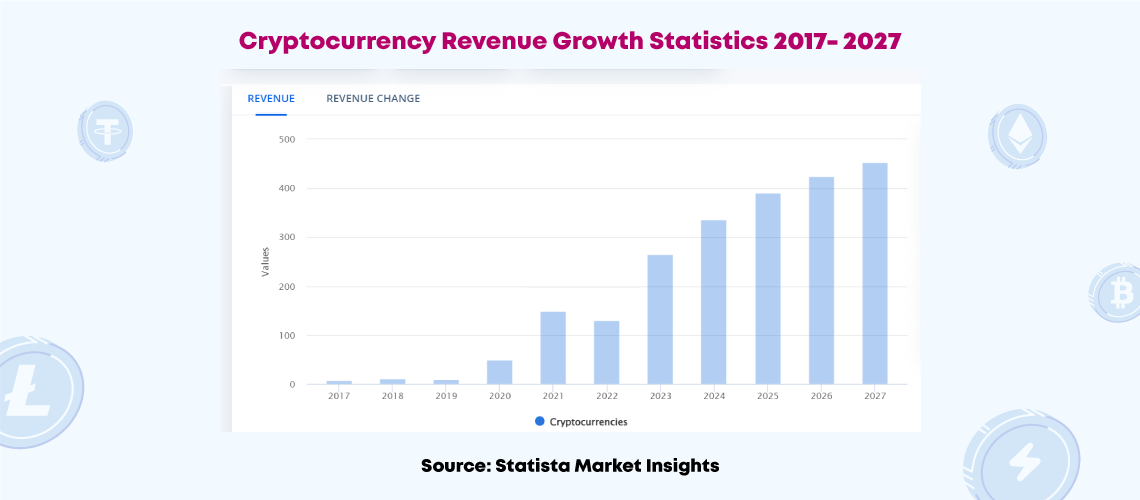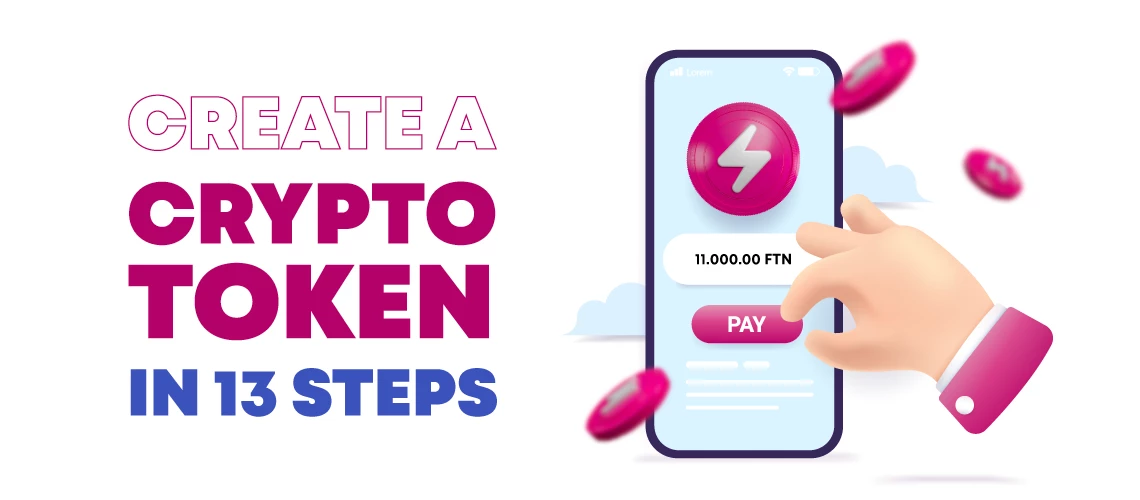Blockchain technologies have taken the digital world by storm in the last couple of years. Businesses, thriving to be the first in their respectable industries, strive to keep up with the fast-paced development of new mechanics and solutions. While it was essential to digitalise offerings to stay afloat, a simple website or mobile application no longer captivates in today’s dynamic environment.
Today, the new industry standard is integrating blockchain and, more specifically, creating tokens for your business growth. This new phenomenon interests many; however, it can repulse anyone who isn’t really sure how to create tokens or even why they need to consider it. Despite the perceived complexity of crypto token creation, there are dedicated tips and solutions to taking the burden from your shoulders.
So, without further ado, let’s jump straight into this new world and figure out what exactly crypto tokens are, why you should obtain one, and what is the easiest way to create a token.
Table of Contents
What Are Crypto Tokens?
A crypto token is a digital representation of an asset or ownership interest that has been converted into a digital format and securely stored on one of the existing cryptocurrency's blockchains.
While crypto tokens and cryptocurrencies can sometimes be confused with one another, they serve distinct purposes. Cryptocurrencies are the native assets of specific blockchain networks, whereas crypto token creation is done on the platforms that operate on these blockchains.
3 Main Types of Crypto Tokens
While both crypto tokens and cryptocurrencies can be traded and hold economic value, tokens can also be customised to represent physical assets, traditional digital assets, or provide specific utility or services.
-
Value tokens
The first type of crypto tokens represents an object of value, often being digital assets like art or music, typically in the form of NFT.
-
Utility tokens
These tokens serve as tools to access specific services. They allow users to operate certain actions within a blockchain network or a decentralised application.
-
Security tokens
The last category of tokens grants ownership rights to an asset. Companies frequently use those types of tokens to secure capital through the sale of equity tokens.
Why Create a Cryptocurrency Token?
So, why do you consider creating a token? Typically, there are 4 primary reasons driving this decision. Moreover, these reasons are oftentimes interchangeably connected, and you need to consider the why factor before thinking about how to create a crypto token.
Fintech and Payments
Financial stability and flexibility are one of the main reasons why businesses decide to create their own crypto token. These tokens are digital currencies, which means that they don’t get controlled by central banks or other financial institutions, making transactions quick and hassle-free.
Raise Funds
Another reason for creating tokens is fundraising projects. Whether it's a small funding to kickstart a business, or a large crowdfunding campaign, raising funds with crypto tokens allows one to avoid many regulations and paperwork and offers direct access to a broader investor base.
Brand Building
Creating a branded crypto token gives a bit of an edge to businesses, making them seem more accountable and valuable. It not only increases brand awareness but also shows the openness of the company to technology advancements and a dedication to go the extra mile to provide new payment methods to customers.
Product Adoption
Last but not least, custom tokens can be used in the product adoption process - either for exchange with currencies or as vouchers. In both of those forms, customised product tokens can become a helpful addition by providing a free marketing budget for businesses.
13 Steps to Create Your Own Token
Now, let’s talk about the most challenging part: how to create a crypto token. Conditionally, there are 13 steps in crypto token development that you need to follow. Let’s walk through each of them.
1. Define Your Token's Purpose
As we mentioned above, clearly defining your future token’s purpose is half of the whole deal. Why are you creating a crypto token, and what exactly is it supposed to do? Is it a utility token created for offering your services, or do you need to create NFTs and value tokens built on a metaverse-related platform?
2. Choose a Blockchain Platform
Once you’ve clarified the purpose of your token, the next step is to choose a blockchain platform that aligns with your specific requirements. There are several trustworthy choices, the most popular being Bahamut, which has an open-source DLT platform and supports custom token creation. Other well-received choices include Ethereum, Binance Smart Chain and more.
3. Select the Token Standard
Now the selection of a token standard comes into play. Opting for an ERC-20-based token means incorporating all the features of ERC-20, enabling the creation and issuance of smart contracts on the Ethereum blockchain. NFTs, on the other hand, are ERC-721 tokens that have a bit different properties, making your tokens non-fungible and belonging to specific owners.
4. Design and Develop the Token Smart Contract
Every crypto token is based on smart contracts, which are software components operating on a blockchain. So naturally, this is the next step you should worry about. Several key questions you need to consider in the process of developing a Smart Contract; is it immutable or changeable? Does it require additional features, and will it need ownership attributes in the future? Although many other queries may arise during the development process, it’s crucial to cover the majority of them right from the start.
5. Test the Smart Contract
Once deployed on the mainnet, Smart Contracts will be pretty burdensome to change in case of errors or bugs. That’s why it’s important to perform multiple tests on the blockchain’s testnet beforehand.
6. Deploy the Token on the Blockchain
Once you’ve verified the proper functionality of your Smart Contracts with no issues, the next step is to deploy your token to the blockchain. This process is fairly simple; utilise the blockchain’s protocol to issue your token, and after covering the network fees, the deployment is considered complete.
7. Develop a Token Distribution Strategy
Now it’s time to distribute your token. Plan marketing strategies to raise interest around your token. Some of the most popular tactics are Initial Coin Offerings (ICOs), pre-sales and private sales, airdrops, token swaps and more.
8. Market and Promote Your Token
Following this, raise brand awareness for your token for it to drive more demand. Build a loyal customer base through various marketing tactics, including social media promotions and shoutouts from influencers. Seek listings on crypto exchanges to improve liquidity and accessibility.
9. Manage Ongoing Operations
Constantly check your token’s condition, make necessary upgrades and enhancements, and address any concerns voiced by the users. Perform potential updates or improvements in response to feedback and evolving market dynamics, creating a proactive approach to token management.
10. Comply with Regulations
Regulations are evolving all the time, so you need to review and update your compliance measures continuously. Keep an eye out for the shifts in laws, regulatory guidance, and industry best practices. Stay active in adapting to the ever-changing regulatory landscape.
11. Provide User Support and Engagement
Building trustworthy relationships with potential customers is the next big step. That’s why you need to pay close attention to their complaints and suggestions and take measures accordingly. Prioritising user support and engagement strengthens confidence, stimulates growth, and cultivates a thriving token ecosystem.
12. Monitor and Analyse Token Performance
To uphold a positive user experience, consistent monitoring of the token's performance, market dynamics, and user engagement is crucial. Regularly analysing this data enables informed decision-making regarding the token's future trajectory.
13. Adapt and Innovate
Flexibility and innovation are key in the evolving landscape of cryptocurrencies. Your token can continuously adapt its features and use cases by remaining receptive to feedback and responsive to changes within the crypto sphere. This adaptability fosters an environment where user needs are met, and the token remains relevant amidst shifting market dynamics.
The Future of Token Creation
The crypto future is happening right now. It promises to be dynamic, exciting and extremely impactful on all of its adjacent industries. According to Markets & Markets, the tokenisation market is expected to reach $5.6 billion by the end of 2026.

Obviously, there are numerous businesses and markets that can and will change from tokenisation. Some of the markets that will receive the most benefits include:
- Traditional Assets, such as real estate, artworks, and intellectual property, are on the way to partial or complete tokenisation, opening new prospects in ownership structures.
- Security Tokens will benefit from crypto advancements, as they have the potential to replace traditional fundraising methods and create transparency for investors.
- Decentralised Finance (DeFi) applications will create cutting-edge financial products or services, designing new rules for trading.
How Can BetConstruct Help You Create a Custom Crypto Token?
Having learned how to create a token, the next crucial step is choosing an appropriate partner that can lead you through this process. BetConstruct is one of the pioneers who constantly merges crypto technologies with iGaming solutions. Its recent groundbreaking features - Custom Token features and Multi-Wallet, move the crypto advancements further and can help you achieve success.
The Multi-Wallet allows users to manage various currencies from one platform, including both cryptocurrencies and fiat and make deposits and withdrawals easy in all conversions. It also facilitates easy integration with popular crypto wallets like Metamask.
On the other hand, BetConstruct’s Custom Token, developed on Bahamut via Smart Contracts, offers adaptable variables tailored to diverse business requirements. As part of this comprehensive offering, BetConstruct also manages technicalities by maintaining token listings on both centralised and decentralised exchanges, managing liquidity, facilitating market-making, and helping in promotions and marketing.
Furthermore, the company assists in legal aspects by supporting in establishing of token-issuing entities, drafting whitepapers, offering legal opinions, setting up bank accounts, forming agreements, and acquiring crypto exchange licences across various jurisdictions.
Final Thoughts
Creating a crypto token in today’s market involves embracing innovation and adaptability in the ever-evolving crypto landscape. Before delving into this realm, it’s crucial to get familiar with different token types, understand their value, and define the purpose of your future token.
Remaining informed and adaptable in the crypto space is vital. Evolving regulations, market dynamics, and user preferences demand constant attention. Engaging users, providing support, and analysing token performance is the only key to success.
The future of tokenisation holds a big promise, transforming multiple industries and having an immense impact on every tech-driven market. Traditional assets tokenise for new ownership prospects, while security tokens and DeFi revolutionise financial landscapes.
Although it may seem like a pretty baffling procedure, BetConstruct can help to stay ahead of the game without much effort. The company offers innovative crypto solutions, introducing possibilities with multi-wallets and custom token features, enabling businesses to explore the world of custom crypto tokens.
And as the crypto landscape evolves, staying proactive, adaptable, and informed will be the cornerstone for success in creating and managing custom crypto tokens in this dynamic era.

















